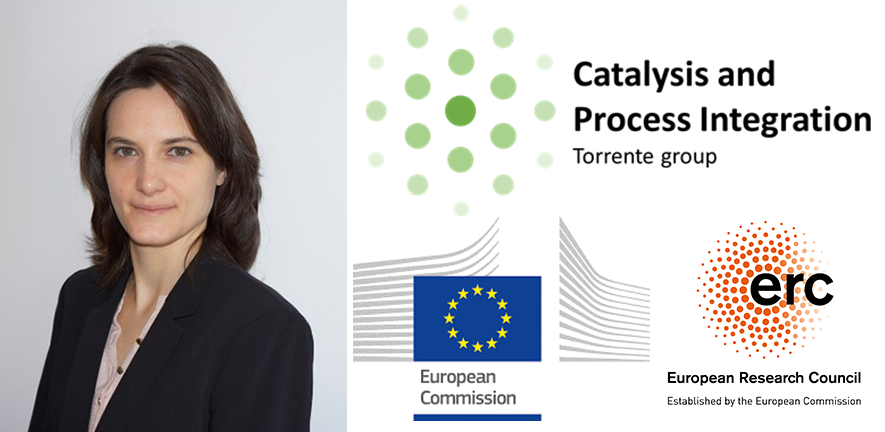
Submitted by Ellie Hall on Thu, 28/04/2022 - 12:53
Dr Laura Torrente, leader of our Catalysis and Process Integration group, has been awarded a European Research Council (ERC) Consolidator Grant of €2.1 million to develop novel processes and functional energy materials for the storage of renewable energy in ammonia, a carbon-free energy vector.
One of the barriers to the realisation of a carbon-free society is the intermittent and geographically isolated nature of many renewable energy sources. To be able to move to carbon-free energy generation, we need to develop ways to store or distribute energy from renewable sources, so that it can fully meet our global energy demands.
Ammonia shows tremendous potential to alter the energy landscape due to its high energy density (~3 kWh/litre, comparable to that of compressed natural gas) and an existing global transportation and storage infrastructure – ammonia is produced globally on a massive scale for its use as fertiliser. It therefore offers a readily competitive option as a zero-carbon energy vector.
Torrente’s ambition, through her ERC project RestartNH3, is the long-term storage of renewable energy in ‘green ammonia’, providing not only buffer capabilities but also versatility in its end-use, where ammonia can be combusted, decomposed to release hydrogen or used directly in ammonia fuel cells (in the future).
The focus of her ERC Consolidator project is to redefine the way ammonia is synthesised. For over 100 years, this has been via the conventional Haber-Bosh process – a process that is highly optimised for extracting energy and hydrogen from fossil fuels, consuming 2% of global energy production and generating around 3% of global carbon dioxide emissions.
Its centralised manufacturing (normally close to natural gas reservoirs) benefits from economy of scale and long-term continuous operation, which is not suitable for electrification and is unable to cope with the intermittency of energy produced from renewable sources.
“Reversing our dependency on fossil fuels is one of the main global challenges, and a driver behind a large number of the UN Sustainable Development Goals and is, ultimately, the main aim of this Consolidator project,” says Torrente. “We want to deliver green ammonia through a new synthesis method that is an efficient, agile, low-capital and distributed process, driven exclusively by renewable energy, water (as a source of hydrogen) and air (as a source of nitrogen).”
The ERC grants are one of the most prestigious awards in the European funding landscape, awarded by the European Research Council to pursue the most promising avenues at the frontier of science. ERC Consolidator Grants are designed to support excellent researchers in ground-breaking and ambitious projects with the potential to transform their research fields.
Find out more...
More information about Dr Torrente’s research in this area can be found in the following papers:
Current and future role of Haber–Bosch ammonia in a carbon-free energy landscape, C. Smith, A. K. Hill and L. Torrente-Murciano, Energy Environ. Sci., 2020, 13, 331-344, DOI: 10.1039/C9EE02873K
Exceeding Single-Pass Equilibrium with Integrated Absorption Separation for Ammonia Synthesis Using Renewable Energy—Redefining the Haber-Bosch Loop, C. Smith and L. Torrente-Murciano, Adv Energ Mater, 2021, 11, 2003845, DOI: 10.1002/aenm.202003845

